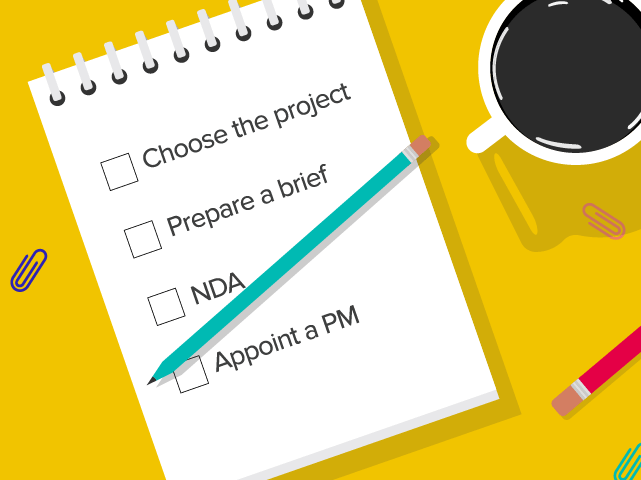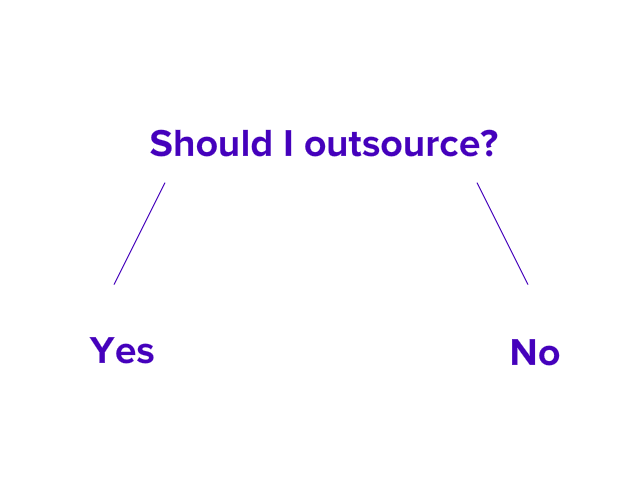The word “outsourcing” has always been somewhat of a stigma. Especially in the tech industry, where outsourcing became so widely used that it evolved into an industry of its own. Hundreds of outsourcing agencies came into the business and it’s fair to say, a lot of them knew very little what they were doing. The word started to associate with a questionable quality and even those companies that frequently outsource, are trying to be silent about their involvement in it.
But nevertheless, outsourcing is as popular as ever because if done right, it can move your business to a whole new level. It can make your operations work more efficiently, can take away routine work that you don’t want to do and it can greatly reduce your costs.
You need to be smart with it though, as with most business strategies out there, the success of it relies totally on you. And for every success story, there are two failure ones to match it.
In this article, we’ll discuss steps you need to take to ensure your outsourcing experience will go the right way. We will focus on web development outsourcing here, since we’ve been the outsourcing partner for digital agencies since 2013 and know a thing or two about it.
Stage 1. Decide Whether You Really Need to Outsource Web Development

Before making a big decision like the one to start outsourcing, you need to think what part of your work will actually be beneficial to outsource for you.
“It is obviously very dependent on a type of company you have, but generally, you only outsource your non-core operations.”
For example, if you’re producing wine, it will make sense to outsource production of the bottles to someone else. Same as for a digital marketing agency to outsource web development.
A great way to decide whether you need to outsource is to calculate costs and time spent on that particular activity. Compare that to rates you will be paying for outsourcing that work and if dollar signs start to pop up in your eyes, that’s a good indication to consider outsourcing.
Cutting costs is not the only reason to do it. By outsourcing non-core operations, you can free up your time to work on your core activities and to grow the business. It’s especially important if you’re in the early stages of your business when you simply can’t handle everything yourself. But make sure you outsource something that you actually understand and have some experience working with. Outsourcing is not a cure for ignorance.
Another big advantage is the access to great resources you get. By outsourcing web development, for example, you can potentially find specialists that are far more advanced than your internal staff. And they will be available whenever you need them.
All in all, advantages of outsourcing usually outweigh their disadvantages. But you need to find a good outsourcing partner in order to succeed.
Stage 2. How to Identify a Good Outsourcing Partner?

The whole process should not be much different than if you’d go headhunting a possible employee. You try to get as much information on them as possible. Look for reviews about them, try to contact their present or past customers.
Unfortunately, in 9 out of 10 cases you won’t be able to get that information, because outsourcing companies (us included) tend not to disclose who they’re working with. And their customers are even less likely to do so. But that’s not really a problem – just interview them!
We suggest you ask them the following questions:
- Do they have a transparent process?
Every stage of the work should be described to you in great detail. Design, development, quality assurance, work with feedbacks, everything. You should know what you’re spending each cent for. All timeframes should be crystal clear as well. If they have systematic approach – it’s a good sign they know what they’re doing. - Do they give you a clear instruction of what they expect from you?
This one is really important. If they do have a good process in place, they should have a set of requirements for you to follow. For example, how do they want to collect your project specifications or feedbacks and what tools to use. - Do they have enough capacity to handle your projects?
You’re looking for a long-term partnership and you have a rough estimate of how many projects you’re going to send their way. Will they be able to keep up with your demands? Is there a risk of a capacity bottleneck in the future? - Do they have a dedicated manager that you will be constantly in contact with?
Who will be your first point of contact? When will they be available (outsourcing usually means different time-zones)? There should always be a person you can rely upon for handling all your questions/requests. - Do they have quality standards?
This should really go without saying, but not all of the outsourcers do have them. It’s the rules they set for themselves and those you can be 100% confident they will follow every time. So you know the end product will be held to a certain standard. - Can they provide a portfolio of their work?
Check their previous work to get the idea of their abilities. Ask whether they have a track record of producing projects similar to yours. - What guarantees do they give?
For you to rely on external workers is risky, you need to be sure the final project will meet your expectation. So pay attention to the contract and check what satisfaction guarantee they provide. So you’re not left holding the bag in the end. - Do they provide further support of the product?
If something goes wrong after the final delivery, will they fix it for free?
Extra tip – If during your first interaction, the outsourcer asks questions about you to evaluate if it’s a good fit, that’s a sign they care about you. Be careful with those who desperately try to ‘close a deal’ rather than to understand your needs.
If you get all “checks”, you may have found a solid partner for yourself!
Stage 3. What Do You Need to Prepare

Managing your first outsourced project could come with a great fear of a lack of control. There is a risk of you being misunderstood regarding your projects or your objectives in general. To make sure you have set up a good process for working with your outsourcing partner, follow the next steps:
- Choose the right project to start.
You should be careful with choosing the first outsourced project. Generally, it’s better to start with something similar to the projects you’ve done before. That way you can easily evaluate the difference between managing it in-house and outsourcing. Try to find a risk-free project to start, so in case something goes wrong, it won’t take a toll on your business. - Prepare a brief.
The way you prepare a brief is a crucial factor for the success of your project. Everything should be stated perfectly clear with as much detail as possible. It is especially important if it’s the first project. Don’t leave your outsourcing partner with too much to figure out themselves. Don’t make them guess. Remember, that it’s your responsibility to elucidate on the way your final product will look like. - Decide whether you need an NDA.
It is a common practice for outsourcing firms to sign a non-disclosure agreement with their client. If you’re sharing some delicate information regarding the project or you don’t want to leave any traces of your outsourcing, make sure you have an NDA in place. - Appoint a project manager.
To avoid any communication problems, when important information is not being passed to the right person, you should appoint one person responsible for the project. Or you could appoint yourself for the role. Make sure your communication channels and the reaction time are being discussed beforehand. - Comply with your partner’s instructions.
As we discussed before, a good outsourcer should have a set of instructions for you in order for their process to work smoothly. Usually, it’s the way they want to receive website specifications or feedbacks later on, tools they’re using for design, version control, etc. Don’t sweat it, if something is too different to the ways you used to, you can ask them to collect your preferences and make an exception for you. - Trust your partner’s experience.
At this point you should have done your homework and chose a great outsourcing partner, so don’t forget that. There is a great chance, they already helped dozens of businesses like yours with their workload. They should know the latest trends in the industry and are likely to provide great expertise in what they are doing. They also care about delivering a good project as much as you do and will do everything they can so you will come back for more.
Keeping those in mind, your first outsourcing project is shaping up to be a great one.
Stage 4. The Honeymoon Is Over – Now What?

After finishing your first project, you need to evaluate the work done. Did all go according to plan? Did they deliver on all of their promises? In other words, after talking the talk, did they walk the walk?
It’s important to remember that everybody makes mistakes, but pay close attention to how your outsourcing partner handles them. Are they owning up to them and offering to fix them, or do they try to avoid any extra work and put the blame on you?
Outsourcing is a two-way relationship and just like all great relationships, they require a commitment by each partner.
You need to be prepared to manage projects across time differences and cultural barriers. The communication is key here. Often you will only have a few hours where your working time will intersect. So it’s better to over communicate than leaving something unclear.
Also, try to be very clear with your feedback regarding their work. Feedbacks will help to constantly improve your partnership.
Having all that in mind, you should have a long and fruitful partnership.
Conclusion
To summarise, if done right outsourcing could be a great way for you to make that next step for your business. The benefits include:
- Lower development costs
- Quicker turnaround
- Increased efficiency
- Access to great talent
- More time for your core operations
But you shouldn’t go for outsourcing unprepared or else it could end up being a disappointment. Be careful with choosing your outsourcing partner and make sure you have a solid internal process in place.
However, if you follow the steps described above, you’ve pretty much covered all the bases and your possible outsourcing partnership should be a great one!




